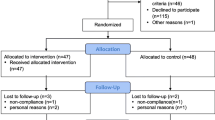Abstract
The contribution of training procedures designed to alter individuals' psychological responses to stressful life stimuli to the reduction of blood-pressure levels of hypertensives was evaluated. The treatment consisted of a set of coping skill-building experiences. Forty-one black males, mildly to moderately hypertensive and under medical supervision in an outpatient cardiovascular unit of a veterans' hospital, participated. Subjects were randomly assigned to one of three groups: Cognitive Self-Management Training (CSM), Attention Placebo Control, and Current Clinic Conditions Control. The dependent measures were the State Anxiety Scale, Trait Anxiety Scale, Coping Strategic Inventory, systolic blood pressure, and diastolic blood pressure. Subjects in the CSM group reported significant increases in the use of cognitive coping strategies in their lives and demonstrated significant decreases in measured levels of state anxiety and systolic blood pressure. Promising reductions of diastolic blood pressure ratings were obtained as well.
Similar content being viewed by others
References
Bara, B. G. (1984). Modifications of knowledge by memory processes. In Reda, M. A., and Mahoney, M. (eds.),Cognitive Psychotherapies, Ballinger, Cambridge, Mass, pp. 47–64.
Beck, A. (1976).Cognitive Therapy and the Emotional Disorders, International Universities, New York.
Brod, J. (1983). Stress and arterial hypertension. In Selye, H. (ed.),Selye's Guide to Stress Research, Vol. 2, Van Nostrand Reinhold, New York, pp. 375–439.
Buckley, J. P. (1983). Present status of stress research related to the development of cardiovascular diseases. In Selye, H. (ed.),Selye's Guide to Stress Research, Vol. 2, Van Nostrand Reinhold, New York: pp. 375–439.
Carver, C. S., and Scheier, M. F. (1981).Attention and Self-Regulation, Springer-Verlag, New York.
Chesney, M. A., and Rosenman, R. H. (eds.) (1985).Anger and Hostility in Cardiovascular and Behavioral Disorders, Hemisphere/Harper & Row, New York.
Datey, K. K., Deshmukh, S. N., and Davi, C. P. (1969). “Shavasan”: A yogic exercise in the management of hypertension.Angiology 20: 325–333.
Ellis, A. (1962).Reason and Emotion in Psychotherapy, Stuart, New York.
Feinstein, A. R. (1967).Clinical Judgment, Williams and Wilkins, Baltimore.
Gentry, W. D. (1985). Relationship of anger-coping styles and blood pressure among black Americans. In Chesney, M. A. and Rosenman, R. H. (eds.),Anger and Hostility in Cardiovascular and Behavioral Disorders, Hemisphere/Harper & Row, Washington, D.C.
Holcomb, W. (1979).Coping with Severe Stress: A Clinical Application of Stress-Inoculation Therapy, Unpublished doctoral dissertation, University of Missouri-Columbia, Columbia.
Holroyd, K. A., and Andrasik, F. (1978). Coping and the self-control of chronic tension headache.J. Consult Clin. Psychol. 46: 1036–1045.
Holroyd, K. A., Andrasik, F., and Westbrook, T. (1977). Cognitive control of tension headache.Cognit. Ther. Res. 1: 121–133.
Holroyd, K. A., Appel, M. A., and Andrasik, F. (1983). A cognitive-beahviroal approach to psychophysiological disorder. In Meichenbaum, D., and Jaremki, M. (eds.),Stress Reduction and Prevention, Plenum, New York, pp. 219–259.
Hussian, R. A., and Lawrence, P. S. (1978). The reduction of test, state and trait anxiety by test specific and generalized stress inoculation.Cognit. Ther. Res. 2: 25–28.
Jacob, G., Kraemer, H. C., and Agras, S. (1977). Relaxation therapy in the treatment of hypertension.Arch. Gen. Psychiat. 34: 1414–1427.
Jagger, P. I., and Braunwald, E. (1977). Hypertensive vascular disease. In Thorn, G. W., Adams, R. D., Braunwald, E., Isselbacher, K. J., and Petersdorf, R. G. (eds.),Harrison's Principles of Internal Medicine, 8 ed., McGraw-Hill, New York, pp. 1307–1318.
Jones, J. F., Ray, C. G., Minnich, L., Hicks, M. J., Kibler, R., and Lucas, D. (1985). Evidence of active Epstein-Barr virus infection in patients with persistent, unexplained illnesses: Elevated anti-early antigen antibodies.Ann. Intern. Med. 102: 1–6.
Kendall, P. C. (1983). Stressful medical procedures. In Meichenbaum, D., and M. Jaremko (eds.),Stress Reduction and Prevention, Plenum, New York, pp. 219–259.
Lacey, J. I. (1962). Psychophysiological approaches to the evaluation of psychotherapeutic process and outcome. In Rubinstein, E. A., and Parloff, M. B. (eds.),Research in Psychotherapy, American Psychological Association, Washington, D. C., pp. 160–208.
Lazarus, R., and Folkman, S. (1984).Stress, Appraisal, and Coping, Springer, New York.
Meichenbaum, D. (1977).Cognitive-Behavior Modification: An Integrative Approach, Plenum, New York.
Meichenbaum, D., and Cameron, R. (1973). Stress inoculation: A skills training approach to anxiety management. Unpublished manuscript, University of Waterloo, Waterloo.
Mitchell, K. R., and White, R. G. (1977). Behavioral self-management: An application to the problem of migraine headaches.Behav. Ther. 8: 213–221.
Morrison, R. L., Bellack, A. S., and Manuck, S. B. (1985). Role of social competence in borderline essential hypertension.J. Consult. Clin. Psychol. 53: 248–255.
Novaco, R. W. (1976). Treatment of chronic anger through cognitive and relaxation controls.J. Consult. Clin. Psychol. 44.
Schutz, W. K., and Woods, M. (1978).Coping Operations Preference Enquiry, Gryphon Press, Highland Park, N. J.
Spielberger, C. D., Gorsuch, R. L., and Lushene, R. E. (1970).STAI Manual, Consulting Psychologists Press, Palo Alto, Calif.
Straus, S., Giovanna, T., Armstrong, G., Lawley, T., Preble, O., Henle, W., Davey, R., Pearson, G., Epstein, J., Brus, I., and Blaese, R. M. (1985). Persisting illness and fatigue in adults with evidence of Epstein-Barr virus infection.Ann. Intern. Med. 102: 7–16.
Thoreson, C. E., and Eagleston, J. R. (1985). Counseling for health.Counsel. Psychol. 13: 15–85.
Turk, D., Meichenbaum, D., and Genest, M. (1983).Pain and Behavioral Medicine, Guilford Press, New York.
Author information
Authors and Affiliations
Rights and permissions
About this article
Cite this article
Bosley, F., Allen, T.W. Stress management training for hypertensives: Cognitive and physiological effects. J Behav Med 12, 77–89 (1989). https://doi.org/10.1007/BF00844750
Accepted:
Issue Date:
DOI: https://doi.org/10.1007/BF00844750




